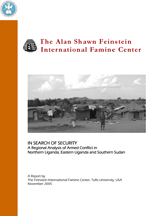The war and humanitarian crises engulfing northern Uganda are intricately linked with the armed conflict and unrest in eastern Uganda and southern Sudan. As a result of the links between the upheavals in these three areas, a vicious cycle of interlocked armed conflict and insecurity exists across the region. Yet the current policy of key international donor governments, the World Bank, the United Nations, and the African Union of addressing these conflicts in relative isolation may ultimately guarantee that armed conflict continues in the region. Regardless of the optimism surrounding the current peace agreement between the government of Sudan (GoS) and the Sudanese People’s Liberation Movement/Army (SPLM/A), given the existing conditions on the ground, it is likely that this region will continue to be mired in violence and crises unless policymakers and donors adapt their perspective to take into account the larger regional picture.
Identifying and understanding the ways that the conflicts in these areas are linked requires a more holistic regional approach than has been articulated to date. This study provides in-depth, field data on the facets of the specific conflicts and makes clear the broader regional links to best inform policy and program formation in the following areas: protection of civilian populations, DDR, peaceful resolution to the conflicts, transitional justice, conflict prevention, and the strengthening of sustainable livelihoods.
The current briefing report “In Search of Security” presents findings from research conducted between January and October 2005. This first phase of research in the larger project focused on the use of military approaches to address the conflicts, the rise of militias, the regional trade in weapons, and current disarmament and demobilization attempts. The full report on these topics will be available January 2006.
The study is an on-going, multi-year field-based undertaking involving a core team of eight researchers from Uganda, Kenya, Sudan, and the United States. Funding is provided by the International Development Research Centre, Ottawa, Rights & Democracy, Montreal, the Peace-building Fund, Child Protection Unit, and Gender Equality Division of the Canadian International Development Agency, and the Andrew Mellon Foundation.







